Skip to comments.
The O Antiphons
WDTPRS.com ^
| not given
| WDTPRS.com
Posted on 12/17/2009 7:52:56 PM PST by Salvation
The O Antiphons
The O Antiphons developed from an ancient custom in the Church going back to the seventh or eighth century. There are seven of these special antiphons, and their texts spring from the Old Testament Hebrew Scriptures, the Prophetic and Wisdom Books. They are found in the Liturgy of the Hours, or Breviary, which clerics, some religious orders, and some lay people use for daily prayer.
The O Antiphons are short prayers recited before and after the Magnificat, the great prayer of Mary used during Vespers, evening prayer, beginning on December 17, seven days before the Vigil of Christmas (December 24). The seventh and last antiphon is sung during Vespers of December 23. They are called the "O Antiphons" because they all begin with the letter-word "O" for they address Jesus by one of His Old Testament titles. They are fervent prayers asking Him to come to us.
Remember that Advent is about the many ways in which the Lord comes. He came at Bethlehem in the fullness of time and so, in the liturgical year, he comes to us sacramentally. He will also come again at the end of the word, as Judge of the living and the dead. Christ comes to us also in the consecration of bread and wine by the priest at Holy Mass and, in a special way, perhaps the most profound way, in a good Holy Communion. He comes in the person of the priest, who is alter Christus, another Christ. He also comes in the person of our neighbor, especially those who are in need of the spiritual and corporal works of mercy. Christ comes in many ways and, during Advent, John the Baptist has been reminding us in the liturgy to "make straight His paths".
There is a little-known fact about the order of these ancient O Antiphons. This is not apparent in English, but it can be seen clearly in the official language of the Roman Catholic Church: Latin. The Latin versions of each of the titles of the Messiah: Sapientia (Wisdom), Adonai (Lord), Radix (Root), Clavis (Key), Oriens (Dawn), Rex (King), and Emmanuel (Emmanuel). Take the first letters of each of the titles and write them backwards, thus counting down the days of the feast: EROCRAS or "ero cras." This means in Latin "I will be (here) tomorrow".
The song "O Come, O Come, Emmanuel" is simply a slightly modified sung version of the seven O Antiphons.
TOPICS: Catholic; History; Prayer; Theology
KEYWORDS: advent; catholic; christmas
Navigation: use the links below to view more comments.
first 1-20, 21-28 next last
1
posted on
12/17/2009 7:52:56 PM PST
by
Salvation
To: nickcarraway; Lady In Blue; NYer; ELS; Pyro7480; livius; Catholicguy; RobbyS; markomalley; ...
Today is Day One of the O Antiphons.
2
posted on
12/17/2009 7:54:36 PM PST
by
Salvation
("With God all things are possible." Matthew 19:26)
To: All
 The O Antiphons: 17 December The O Antiphons: 17 December O Sapientia |
| LATIN: O Sapientia, quae ex ore Altissimi prodidisti, attingens a fine usque ad finem, fortiter suaviter disponensque omnia: veni ad docendum nos viam prudentiae. ENGLISH: O Wisdom, who came from the mouth of the Most High, reaching from end to end and ordering all things mightily and sweetly: come, and teach us the way of prudence.
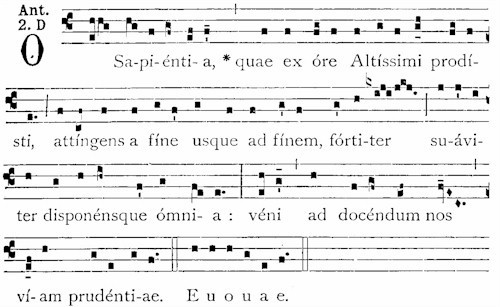 Listen to this chant from the Liber Usualis: mp3 Also, the schola of the North American College in Rome (a bit faint): mp3. Scripture Reference:
Proverbs 1:20; 8; 9
I Corinthians 1:30 Relevant verse of Veni, Veni Emmanuel: O come, O Wisdom from on high,
who orders all things mightily,
to us the path of knowledge show,
and teach us in her ways to go. The version from the Dominican antiphonarium:
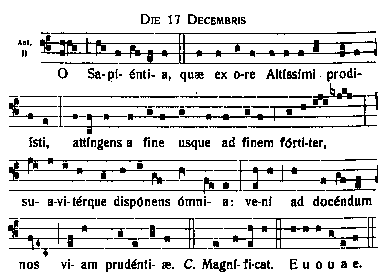
REFLECTION: (ENGLISH: O Wisdom, who came from the mouth of the Most High, reaching from end to end and ordering all things mightily and sweetly: come, and teach us the way of prudence.)On December 17th we enter into that final stretch of our Advent preparation. In the Church's solemn prayer of the hours, at Vespers, the great "O Antiphons" are sung. Today we have the first.
The Son is Eternal. There was never a time when He was not. Through Him all things were made. Through Him order was given to the primal chaos. Thus, the marvelous and sweet order we observe in the universe is due to the eternal wisdom of the eternal Word. That same well-ordering eternal Word is the Word made flesh, who dwell among us beginning with His coming birth at Bethlehem.
Each of the "O Antiphons" carries Old Testament biblical figures. At the same time each one carries an element of the New Covent. These two characteristics are juxtaposed and a third dimension emerges which serves as a point of meditation when considering the Incarnate Word, the Son of God made flesh.
In today's "O Antiphon" - "O Sapientia" - we are drawn into the Old Testament's wisdom literature. Wisdom is a divine attribute. The divine Wisdom is personified. Wisdom is the beloved daughter who was before Creation, Wisdom is the breath of God's power, Wisdom is the shining of God's (transforming) glory. (See Sirach 24:3 and Wisdom 8:1.)
Wisdom is also something which we deeply desire. It is also a human attribute, not just a divine attribute, though authentic human wisdom is never separated from a relationship with God. Fear of the Lord is the beginning of wisdom, as we learn from the psalms as well as the school of personal hard-knocks. From this convergence of awesome respect for God with the experience of learning through life's mysterious calendar, we understand (if we are wise) that wisdom is more than mere knowledge. It is something more than love. It is something more than just a special astuteness regarding how to get along in life, a certain kind of savior faire. Rooted as it is in fear of the Lord, true human wisdom is both love and that knowledge of God that seeks to understand, the knowledge that is completed by faith.
The Prologue of John's Gospel refers to the "Verbum caro factum...the Word made flesh". He is the divine Logos... the eternal thought/word/reason. Through Him all things were made. Without Him nothing can be. So, the New Testament image in the Prologue of John brings to completion the imagery of Wisdom. He, the Word, is the archetype of the material universe. All things are ordered in and to Him.
Our lives, to be happy, need order. Our individual private lives and our collective lives in larger society must have structure and order. They must be disposed in such a way that the real and genuine good of all is fostered and promoted. Thus, in human governance we struggle to find the proper balance of exercise of power (without which governance and order is not possible) and gentle concern for the individual and community (without which there is mere imposition and tyranny and exploitation for some end material or ideological). Wisdom permits the balance of these.
This first "O Antiphon" shows us the Creator of all that is invisible and visible, the whole of spiritual and material creation. It is moving according to an eternally disposed plan of divine Providence toward an inexorable end: that God may be all in all. In this end the blessed elect will participate. We have had the way opened for us toward this end by the Word (divine) made flesh (human). Our humanity now sits in transformed glory at the right hand of the Father in an indestructible bond with the Son's divinity. The risen Christ is the new Adam...the new Creation. With unspeakable sweetness He orders our salvation. With irresistible power all things exist and move according to His will. Our lives have meaning only in Him, according to His guidance, who handles us "suaviter et fortiter".
Our Old Testament and New Testament figures and images merge into a new point of reflection for our lives which today's "O Antiphon" underscores as "prudence" - "Come...Teach us the way of prudence!"
"Prudence" comes from the Latin "to see/look ahead". It is one of the four "cardinal" virtues, one which other virtues depend. Prudence is a habit of the intellect that allows us to see in any circumstance what is virtuous and what is not. Prudence helps us to seek what is virtuous and avoid what is not. Prudence perfects the intellect (rather than the will) in practical decisions. It determines which course of action must be taken. It indicates what the golden mean is hic et nunc...here and now. This mean is at the core of every virtue. Without the virtue of prudence courage becomes foolhardiness... rushing in to the wrong danger in the wrong way at the wrong time. Without the governing of prudence mercy devolves into slackness and enervated weakness, spinelessness.
But this is still a kind of prudence which is merely human prudence, not looking beyond the issues of daily life. We must also look beyond this vale of tears. In addition to the prudence which grows out of the school of hard-knocks and which becomes a sound and good habit through repeated acts, there is another prudence, an "infused" prudence. This kind of prudence is a grace given us by God out of His merciful love. This greater prudence, which governs other grace-filled virtues, cannot be separated from the life of grace. It is exercised in the state of grace. Mortal sin is its enemy. This higher kind of prudence helps us to determine the proper things that help us to salvation. It helps us to avoid things that slam the door that Christ opened (mortal sin). Thus, prudence cannot be separated from charity, which is in the soul as a characteristic of sanctifying (habitual) grace.
Today in the opening "O Antiphon" we sing to Emmanuel who is coming. We plead with Him, for He orders all things "sweetly and strongly." He teaches us how to avoid things that harm us, both in material concerns and in our pursuit of the happiness of heaven. He teaches us true prudence.
Take stock: is there something going on in my life that needs to be examined in prudence? Am I doing something which is going to be an obstacle to the happiness of heaven? Christ is coming, both at Christmas as the infant King and the end of the world as the Judge and King of fearful majesty. This is a cause to rejoice. But it is also cause to prepare prudently and well the way of the Lord and make straight His paths before He comes, as we heard about on "Gaudete" ("Rejoice!) Sunday of Advent. |
3
posted on
12/17/2009 7:56:53 PM PST
by
Salvation
("With God all things are possible." Matthew 19:26)
To: Salvation
4
posted on
12/17/2009 7:58:01 PM PST
by
Steelfish
To: Salvation
Aye, and I am playing Arvo Part’s O Antiphons and Magnificat on the computer right now—and that will continue until Christmas Eve.
5
posted on
12/17/2009 8:02:15 PM PST
by
lightman
(Adjutorium nostrum (+) in nomine Domini)
To: lightman
Can you give us those links?
6
posted on
12/17/2009 8:06:04 PM PST
by
Salvation
("With God all things are possible." Matthew 19:26)
To: Steelfish
7
posted on
12/17/2009 8:06:48 PM PST
by
Salvation
("With God all things are possible." Matthew 19:26)
To: Salvation
As I noted over on Fr. Z's blog, I learned something new today! I've sung
Veni Emmanuel for years, of course, but never realized it was based on the O Antiphons.
WDTPRS is a great blog, btw, and anybody interested in Catholic matters generally and 'slavishly accurate translations' from the Latin in particular, should give it a visit.
8
posted on
12/17/2009 8:07:17 PM PST
by
AnAmericanMother
(Ministrix of ye Chasse, TTGC Ladies' Auxiliary (recess appointment))
To: AnAmericanMother
**’slavishly accurate translations’ **
I laugh when I see this.
9
posted on
12/17/2009 8:14:31 PM PST
by
Salvation
("With God all things are possible." Matthew 19:26)
To: Salvation
Not only do I laugh when I see that, I laugh because we now know it irritates the fire out of Bishop 'Custer's Last Stand' Trautman . . . . in his diatribe about the new ICEL translation, he used the term "slavishly accurate" several times. So he reads WDTPRS (and no doubt does a slow burn while he does).
Thank heaven the days of the hippie bishops and their 'dynamic equivalent' translations appear to be drawing to a merciful close.
10
posted on
12/17/2009 8:18:31 PM PST
by
AnAmericanMother
(Ministrix of ye Chasse, TTGC Ladies' Auxiliary (recess appointment))
To: AnAmericanMother
Thank heaven the days of the hippie bishops and their 'dynamic equivalent' translations appear to be drawing to a merciful close. Yes, but it will be another 10-15 years before all the low-churchites are totally gone. There's still a handful in their 60's.
11
posted on
12/17/2009 8:21:50 PM PST
by
Desdemona
(True Christianity requires open hearts and open minds - not blind hatred.)
To: lightman
I'm playing the Antiphons from a CD. I can't really use YouTube on my dial up connection but it Google says the Antiphons can be found here:
www.youtube.com/watch?v=noRfoBfWtvo
The CD

is available through the Musical Heritage Society and Amazon
12
posted on
12/17/2009 8:21:51 PM PST
by
lightman
(Adjutorium nostrum (+) in nomine Domini)
To: lightman
The Agnus Dei from the Berlin Mass also on that compact disk is probably the finest setting since Mozart's Requiem.
13
posted on
12/17/2009 8:24:12 PM PST
by
lightman
(Adjutorium nostrum (+) in nomine Domini)
To: Desdemona
True, there will be some long-lived holdovers.
But as we've seen with Bp. Trautman, as their numbers decline their influence declines as well. People used to listen to and follow Bp. Trautman, now they just look bored while he rants and raves and ignore what he has to say.
He will continue to make things very unpleasant for the orthodox in his own diocese, more's the pity, but the days when he and his ilk ran the USCCB and thus national Church policy appear to be over.
And that -- like the 10,000 lawyers at the bottom of the Marianas Trench -- is "a good start".
14
posted on
12/17/2009 8:29:22 PM PST
by
AnAmericanMother
(Ministrix of ye Chasse, TTGC Ladies' Auxiliary (recess appointment))
To: AnAmericanMother
I don’t know that the group in their mid-60’s is unorthodox, just low-church. Small ceremonial details and high art don’t mean much to them. They’re happy with whatever volunteers devise. OTOH, they give thousands to PACs and nonprofits fighting for traditional marriage and emphasize the need for larger St. Vincent de Paul pantries. There’s a little of everything there.
15
posted on
12/17/2009 8:38:04 PM PST
by
Desdemona
(True Christianity requires open hearts and open minds - not blind hatred.)
To: Desdemona
I draw a distinction between the "low churchers" - as an ex-Episcopalian I know 'em when I see 'em - and the bishops who actually seem to be out to destroy the Church. Trautman, I'm afraid, falls into the latter category. Vocations are nonexistent in his diocese, and he's closing parishes left and right.
Low-churchers do, as you observe, tend to concentrate on the social action aspects of the Church and ignore the liturgical and transcendent . . . but they don't as a general rule destroy vocations and membership to the extent that the truly heterodox/heretical have done.
16
posted on
12/17/2009 8:45:08 PM PST
by
AnAmericanMother
(Ministrix of ye Chasse, TTGC Ladies' Auxiliary (recess appointment))
To: AnAmericanMother
The USCCB is still run by socialists. They are sowing the seeds of our destruction by lending support to the Democrat Party’s so-called “health care” legislation, even though they, nor almost anyone else, do not know what is in it. But before it passes, it certainly will provide for taxpayer funding of the crime of abortion, among many other very odious things. And that will mean a big increase in abortions.
So - no - even though the hippie bishops may be fading away, there are still many socialists (to put it charitably) among them. And that may be even worse.
17
posted on
12/17/2009 10:52:23 PM PST
by
ducdriver
(judica me, Deus, et discerne causam meam de gente non sancta. (Ps. 42))
To: ducdriver
No arguments on the socialist, but they aren't wholesale destroying what took generations to build anymore. That's very gradually going away.
And it would be helpful if everyone read the legislation. There's lots of stuff lurking in there.
18
posted on
12/18/2009 7:00:15 AM PST
by
Desdemona
(True Christianity requires open hearts and open minds - not blind hatred.)
To: ducdriver
It's more the bureaucrats (especially in the USCCB and CCHD) but as the new bishops come in they will clean house.
Bureaucrats can go along under the radar for quite some time because they're not directly accountable to anyone. But rank and file Catholics are beginning to point out the old rats in the barn to the bishops. And I think many of the bishops are unpleasantly surprised to find out what the middle levels of these organizations have been harboring.
Slowly but surely they are getting the brooms and the flails and the rat terriers into action.
19
posted on
12/18/2009 7:09:34 AM PST
by
AnAmericanMother
(Ministrix of ye Chasse, TTGC Ladies' Auxiliary (recess appointment))
To: All
O Adonai
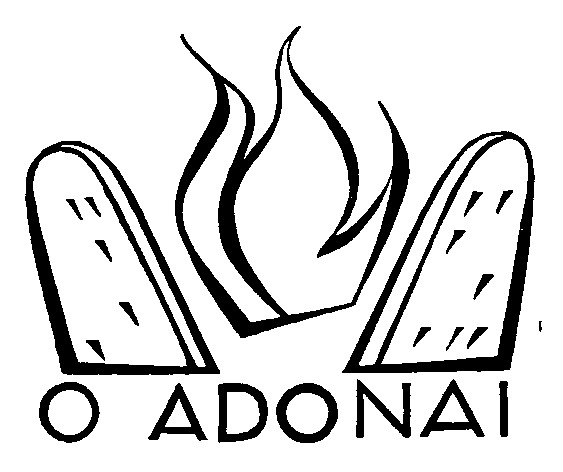 The O Antiphons: 18 December The O Antiphons: 18 December O Adonai |
| LATIN: O Adonai, et Dux domus Israel, qui Moysi in igne flammae rubi apparuisti, et ei in Sina legem dedisti: veni ad redimendum nos in brachio extento.. ENGLISH: O Lord and Ruler the house of Israel, who appeared to Moses in the flame of the burning bush and gave him the law on Sinai: come, and redeem us with outstretched arms.
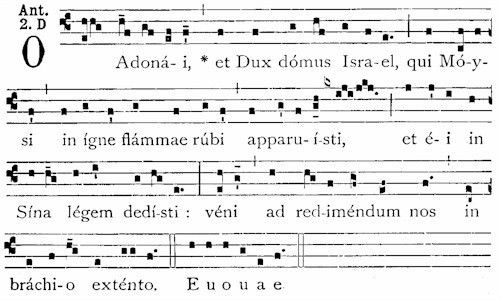 Listen to this chant from the Liber Usualis: mp3 Also, the schola of the North American College in Rome (a bit faint): mp3.
Scripture Reference:
Exodus 3
Micah 5:2
Matthew 2:6 Relevant verse of Veni, Veni Emmanuel: O come, O come, thou Lord of might,
Who to Thy tribes on Sinai's height
In ancient times didst give the law
In cloud and majesty, and awe. The version from the Dominican antiphonarium:
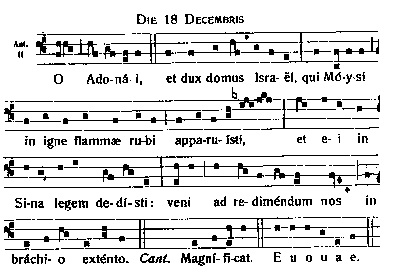
REFLECTION:O Antiphons: 18 December - O Adonai (ENGLISH: "O Lord and Ruler the house of Israel, who appeared to Moses in the flame of the burning bush and gave him the law on Sinai: come, and redeem us with outstretched arms.")
"Adonai" is "LORD." It was the Hebrew word that the Jews used when they found the four-lettered word for God's name which they held to be too sacred to pronounce aloud. Christ is Lord of Creation. We sang this yesterday in the antiphon "O Sapientia". Christ is also Lord of the Covenant with the People He chose. The Lord made covenants with Noah, Abraham, and Moses. He guided them and all the People. He gave them Law. He protected and feed them. The Lord delivered them from bondage to Pharaoh and unending slavery. He went before them with arm outstretched.
This was all a pre-figuring of the great work of redemptions that Christ would work on the Cross. He redeemed us His People from Satan and the eternal damnation of hell. He once appeared clothed in the burning bush that was not consumed by fire. He is about to appear again clothed in flesh in our liturgical celebration of Christmas. He will appear again one day in the future to judge the living and the dead. Each day He appears to us in the person of our neighbor.
What amazing contrasts we find in our Lord! He came in thunder and lightening to give the Law on Mt. Sinai. He comes now in swaddling clothes. He will come again in glory. He comes humbly in the appearance of Bread and Wine.
He still goes before us with outstretched arm and our foes are put to flight at the sight of His banner. |
20
posted on
12/18/2009 8:52:43 AM PST
by
Salvation
("With God all things are possible." Matthew 19:26)
Navigation: use the links below to view more comments.
first 1-20, 21-28 next last
Disclaimer:
Opinions posted on Free Republic are those of the individual
posters and do not necessarily represent the opinion of Free Republic or its
management. All materials posted herein are protected by copyright law and the
exemption for fair use of copyrighted works.
FreeRepublic.com is powered by software copyright 2000-2008 John Robinson
 The O Antiphons: 17 December
The O Antiphons: 17 December 


 The O Antiphons: 18 December
The O Antiphons: 18 December 
